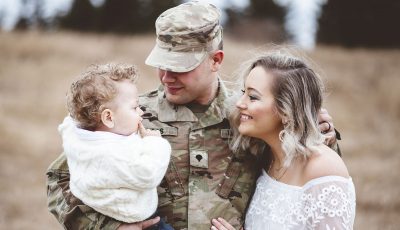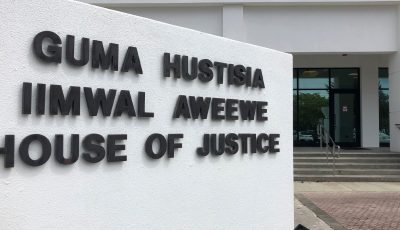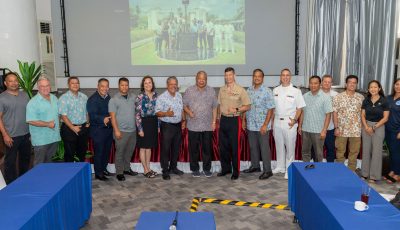Corrections officer Camacho testifies
Corrections officer Ray Anthony Maratita Camacho took the witness stand yesterday in Superior Court and denied he assaulted then-inmate Ryan Cavalear at the Department of Corrections on April 1, 2016.
After Camacho’s testimony, defense counsel Colin Thompson announced that they have no other witness and rested their case. Thompson renewed defendant’s motion for judgment of acquittal, but Superior Court Associate Judge Kenneth L. Govendo denied it.
Assistant attorney general Matthew Baisley also rested yesterday the government’s case after calling in a total of 11 witnesses, including Cavalear.
Before Thompson started the defense’s closing arguments, Govendo, who presided over the bench trial, disclosed that he will announce his verdict today, Tuesday, at 9am.
Camacho is on trial for assault and battery, a misdemeanor offense.
Camacho, who has been employed with DOC for the past 17 years, testified that he did not a apply chokehold, slap, or assault Cavalear.
Camacho said he did not hear Cavalear asking for medicine and that he was also not aware that the inmate had oral surgery a day before that incident.
He said Cavalear was yelling and cursing so he approached and gave him an order to step back, but he refused to comply.
The Corrections officer said Cavalear was not cooperative.
He denied he slapped Cavalear’s face, saying he only tried to protect the inmate’s face from hitting the door.
Camacho said Cavalear claimed to be a veteran but for him he is not a veteran but an inmate.
Cavalear earlier testified that he told Camacho and Corrections Officer Admisen Dasio Haddy to stop dragging and holding his arms up because his spine hurts, as he is an Army veteran and broke his back during his military service.
Camacho answered that either he does not recall and or does not remember to many questions raised by Baisley during cross-examination.
Govendo told Camacho that the trial started a week ago and several witnesses testified in great details, but his repeated answers: “I don’t recall. I don’t remember.”
Govendo said Camacho testified that he believes that holding up the arms of the already handcuffed Cavalear behind his back was a proper way.
Govendo noted that Department of Public Safety police director Pete Deleon Guerrero testified that absolutely it’s not the proper way because that would dislocate the inmate’s arms.
“I’m wondering who trained you that it’s the proper way?” Govendo said.
Camacho replied that maybe it’s not the proper way.
In the government’s closing arguments, Baisley said it’s not the proper way to treat inmates especially to a person who served his country and had surgery during military service.
Baisley said inflicting pain on an inmate should not be tolerated and anyone doing it should be held accountable regardless who the victim is.
Baisley said witnesses corroborated Cavalear’s testimony that Camacho held his neck, slammed him on the floor, and slapped him.
The prosecutor said Camacho’s conduct was unlawful because there is no justification for inflicting pain on Cavalear.
Baisley said both experts—police director Deleon Guerrero and former FBI special agent Frank Ishizaki—agree that they were bothered that Cavalear would dislocate his shoulders.
Baisley said Cavalear was indeed yelling and cursing because he was frustrated in trying to get his pain medication.
“He’s asserting his right to have his medication. He’s in pain,” the prosecutor said.
In the defense’s closing arguments, Thompson said physical force is authorized and that’s the discretion of the officers.
Thompson said what is unlawful is chokehold and the evidence showed that Camacho did not apply that.
He said the two experts—Deleon Guerrero and Ishizaki—testified that DOC officers should be trained better in proper handling of inmates.
Thompson said Camacho did not slap Cavalear as shown by the video’s footage and witnesses’ accounts.
Thompson said based on testimony and evidence, the government failed to prove beyond reasonable doubt to support Camacho’s conviction as to assault and battery.



























